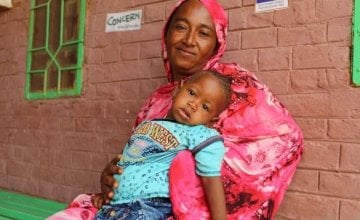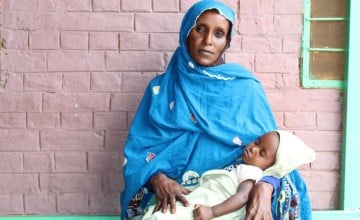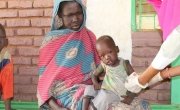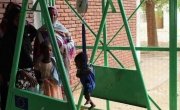
Read our 2024 annual report

Knowledge Hub
Tackling hunger in Sudan

In Sudan, around 5.8 million people don’t always have enough food to eat and persistently high levels of malnutrition are endangering people’s lives. We’ve partnered with the European Union on an integrated, multi-sectoral programme to prevent and treat malnutrition in the country.
Some 80% of the world’s stunted children live in just 14 countries. Sudan is one of those countries. Extreme poverty, inadequate feeding practices and diseases are key drivers for high malnutrition rates, all of which are exacerbated by on-going insecurity and displacement in different regions within the country. According to the 2020 Humanitarian Needs Overview for Sudan, 2.7 million children under the age of five are acutely malnourished – that is 14.1% of all children in that age group.
In July 2018, we teamed up with ECHO on the ‘Lifesaving services for All’ programme, which provided a broad package of support to vulnerable communities living in the West Kordofan region of Sudan. A major aspect of this programme has been the prevention and treatment of malnutrition.
Hamida's story
Hamida Hassan Mohammed lives in Muglad in West Kordofan with her husband and ten children. Her young son Alaa was just six months old when Hamida received a visit from a Community Health Volunteer (CHV). Trained by Concern to screen for signs of malnutrition in children under the age five, the volunteers call to households in their communities and refer children they suspect to be malnourished to the nearest health facility.
Hamida was shocked to discover that her youngest child was showing signs of ‘wasting’ – little Alaa was too thin for his height. He was immediately referred to the local nutrition centre. Staff there weighed and measured Alaa and were able to confirm that he was suffering from malnutrition.
“I was very worried to learn about the condition of my child”, Hamida explained.

Thankfully, Alaa was admitted to our ‘Outpatient Therapeutic Programme’ (OTP). The programme is a central facet of Concern’s nutrition work, which enables malnourished children to receive the treatment they need in the comfort and familiarity of their own homes. Hamida received a week’s supply of therapeutic food to give to her child. The food comes in the form of sachets of peanut paste, which are packed full of the nutrients and calories that children like Alaa need to get better.
In the first week, Alaa’s recovery was slow as Hamida had to coax him into eating the sachets.
“The first week he did not eat much and I had to motivate him. But slowly, my child started eating well”, she explained.
After that, Alaa’s health began to rapidly improve. Hamida was greatly relieved to watch him recover within just one month.
My child was healthy and cured from malnutrition.
Nutrition and health training
That was not the end of Hamida's involvement with Concern’s nutrition programme. Alaa continued to receive treatment for another month, to ensure the stability of his recovery and Hamida took part in training provided through the programme. She discovered that Alaa had become malnourished due to lactation problems and a lack of nutrients in her own diet. Through the training, she was able to learn how to keep herself and her children well-nourished through a varied diet and also the importance of good hygiene in staying healthy and well.
The value of information and knowledge cannot be underestimated when it comes to the prevention of hunger.
All these services reduced the burden of living for me and my children. I felt comfort because they are free of charge. Such services are so important for my community.


Looking to the future
Unfortunately, life for vulnerable communities in Sudan looks set to become even more challenging. Sudan’s economy is suffering at present and local market prices for basic goods are in an upward spiral.
According to the World Food Programme's Market Monitor, the cost of the local food basket reached 53.6 Sudanese pounds in March of this year, which is an astounding increase of 132% compared to the same month last year. The current economic crisis is likely to be compounded by the effects of COVID-19 on the global economy.
Effective support for the most vulnerable communities is needed now more than ever. While the 'Lifesaving Services for All' programme has come to an end, we are continuing our work with support from the EU through an innovative new three-year programme which aims to tackle childhood malnutrition in Sudan and beyond.
Follow us on Instagram
Follow our journey as we tackle hunger and extreme poverty in 23 of the world's poorest countries.





